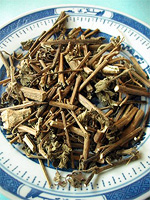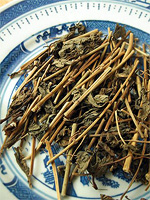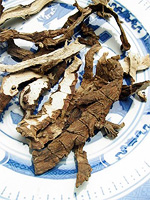Managing Drowsiness Using Chinese Medicine
Drowsiness is a state of near-sleep, a strong desire for sleep, or sleeping for unusually long periods. Drowsy people tend to fall asleep in inappropriate situations or at inappropriate times, which affects their family, social life and job performance.
Excessive daytime drowsiness may suggest the presence of a sleep disorder; other possible causes including:
 |
Long working hours or shift work |
 |
Medications, both prescription and over-the-counter drugs |
 |
Health problems such as hypothyroidism, depression and obesity |
 |
Brain damage |
If clinical examination rules out any physical cause, you may try Chinese medicine methods for relief.
From a TCM viewpoint, yin dominates rest, while yang dominates motion. When the body is in abundant yin or deficient yang, there usually results in a lack of energy and motivation. Individuals with drowsiness have either:
 |
Excessive of yin pathogens such as phlegm and dampness that obstruct the orifices in the head region or disturb the normal functioning of the mind |
 |
Insufficiency of yang qi that keeps the mind alert |
TCM treatment aims at invigorating the spleen, warming the kidney, expelling dampness or dissolving stasis. Furthermore, herbs such as fortune eupatorium herb (pui lan), acorus (shi chang pu) and agastache (huo xiang) help refresh the mind and are commonly adopted to the prescriptions. Physicians will consider the medical history and associate signs when designing the remedy.
 |
 |
 |
| Eupatorium herb |
Agastache |
Acorus |
Turbid dampness disturbed the spleen
Drowsiness associated with bloating, no appetite, excessive throat secretion, fatigue, feeling heaviness in the forehead and limbs. The tongue is covered by white and greasy fur, the pulse is rolling. This disharmony pattern often occurs in the rainy season or in those who are obese. The remedy should expel dampness and invigorate the spleen.
Sample prescription: Calm the Stomach Powder (Ping Wei San) plus agastache, acorus and pinellia tuber.
Heat phlegm obstructed internally
Excessive drowsiness during the day, snoring, yellowish sticky throat secretion, mouth dryness and constipation; a red tongue covered by yellowish greasy fur, and a pulse which is rolling and rapid. The remedy should clear heat, dissolve phlegm and refresh the mind.
Sample prescription: Coptis Decoction to Warm the Gallbladder plus acorus and arisaema with bile (dan nan xing).
Weakness in the middle burner
Drowsiness that is worse after meals, fatigue, loose bowels and abdominal distension. The tongue has little fur and the pulse is weak. The remedy should invigorate the spleen and promote qi production.
Sample prescription: Tonify the Middle & Augment the Qi Decoction (Bu Zhong Yi Qi Tang) plus atractylodes rhizome, costus root and peppermint.
Insufficiency of yang-qi
Excessive drowsiness, mental fatigue, lack of appetite, limb coldness and forgetfulness; a pale tongue, the pulse is deep and weak. The remedy should replenish qi and warm the kidney.
Sample prescription: Aconite Pill for Regulating the Middle (Fu Zi Li Zhong Wan) plus pilose asiabell root and hyacinth bean.
Blood stasis obstructed the orifices
Drowsiness lasting a long time, and which is also associated with dizziness and headache. The tongue looks purplish, or has purple spots on it; the pulse is taut. Individuals may have had trauma to the head. The remedy should activate blood and unblock the meridians.
Sample prescription: Unblock the Orifices and Invigorate the Blood Decoction (Tong Qiao Huo Xue Tang)
Acupuncture therapy activates blood and qi flow, which enhances the self-regulating power of the body and can relieve drowsiness. Acupoints selected are mainly along the heart, spleen, and liver meridians and the Governor Vessel and Conception Vessel.
Acupressure also helps by acting locally to promote blood circulation and remove stagnation. Click to see Acupressure for easing mental stress and relaxation.
Southern China is in sub-tropical zone so drowsiness is a common ailment in the area in summer. TCM regards it as a problem caused by dampness, the hot and wet weather making it easy for the exogenous dampness evils to accumulate in the body. Hot and rainy summers also cause people to feel sweaty, thirsty, irritable, tired, lacking an appetite, and with a heaviness in the forehead and limbs. Herbal beverages made with fresh local ingredients are an ideal way to prevent these summer-induced conditions, and the traditional teas still remain popular remedies in southern China. Certain foods are also recommended to consume during this period: bitter gourd, watermelon, strawberries, spinach, tomatoes, mung beans, cucumber, wax gourd, lotus root, lotus seed, coix seed, bean sprouts, duck and fish. These foods can expel excessive heat from the body and promote urination.
The following is a refreshing soup for summer:
Prepare American ginseng (30g), dried lotus leaf (30-50g), and fresh watermelon (1000g). Wash and chop the watermelon into large pieces (don't remove the green peel). Wash the lotus leaf and ginseng. Put all ingredients in a pot with 1.5 liters of water, bring to a boil and simmer for approximately one hour. Add salt to taste and serve hot.
The soup can clear summer heat, induce urination and relieve fatigue. American ginseng promotes the production of qi (vital energy) inside the body, so this soup can enhance overall body functioning and is especially suitable for those who often work overtime.
|